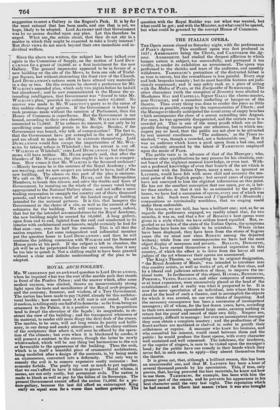-7-- Since the above was written, the subject has been
talked over -again in the Committee of Supply, on the motion of Lord DUN- CANNON for a grant of 10,0001. as a first instalment for the new Gallery. The general impression appeared to be in favour of a new building on the site of the Mews, to form one side of Trafal- gar Square, but without obstructing the front view of the Church. Lord DUNCANNON'S notions seem to have altered very materially in a day or two. On this occasion he showed a preference for Mr. WiLxnes's amended plan, which only two nights before he had all but abandoned ; and he now communicated to the House the as- tounding intelligence, that Government was "bound to take Mr. WILKINS'S plan," provided his estimate was under 62,0001. No answer was made .to Mr. WARBUTON'S query as to the cause of this sudden change of opinion. if the Government is bound by rash promises made without the sanction of Parliament, then the House of Commons is superfluous. But the Government is not bound, according to their own showing. Mr. WILKINS'S estimate amounted to 75,0001. If he reduces its amount, it can only be by sacrificing some material points in his design. Besides, if the Government was bound, why talk of compensation? The fact is, that the Government have got entangled in the net of jobbery, and are afraid to make an effort to extricate themselves. Lord DUNCANNON would fain escape the importunities of Mr. WIL- KINS, by taking refuge in Whitehall ; but his retreat is cut off. " WILKINS or Whitehall," cries Lord DUNCANNON; but the Com- mons will have neither. Mr. HUME properly said, that after the blunders of Mr. WILKINS, the plan ought to be open to competi- tion. How comes it that Mr. WILKINS is the favoured architect? —Merely because he is the nominee of the Royal Academy ; who are wanting, and we now suspect are intended to have, half of the new building. The silence on this part of the plan is ominous. We call on Mr. WARBURTON, Mr. HUME, and the Metropolitan Members, to break this silence, and solve the doubts and fears of Government, by insisting on the whole of the money voted being appropriated to the National Gallery alone; and not suffer a mere trading corporation to smuggle the country out of thirty thousand pounds, and what is worse, half of the limited range of building intended for the national pictures. It is this that hampers the Government in the choice of a site, as well as the amount of the estimates for the building. We will venture to assert, indeed, that but for the intended accommodations for the Royal Academy, the new building might be erected for 50,0001. A long gallery, open from end to end, lighted from the roof, and unadorned in its interior with architectural enrichments, might certainly be had for that sum—nay, even for half the amount. This is all that the nation requires. Let some independent and influential member put the question home to Lord DUNCANNON ; and then he will continue the jobbing connexion with WILKINS and the Somerset House junto at his peril. If the subject is left to slumber, the job will be so far perpetrated before the next session, that it may be too late to quash it. Not a shilling ought to have been granted without a clear and definite understanding of the plan to be adopted.


















 Previous page
Previous page